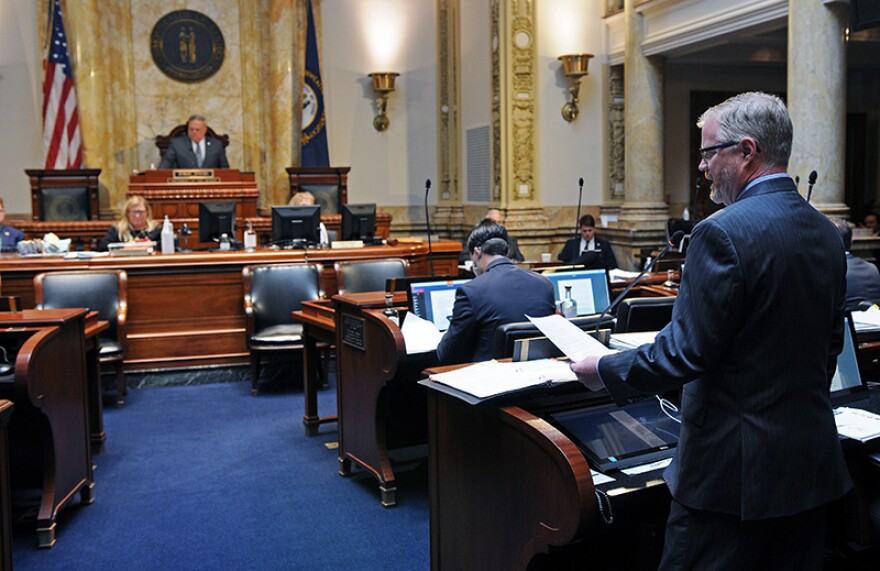Republicans in the General Assembly and statewide offices took aim Tuesday at the state's Democratic governor, who's spent weeks in the spotlight during the coronavirus outbreak. The pushback came in the form of veto overrides, accusations of partisan hypocrisy, and legislation shifting the conversation about which businesses should remain closed.
The GOP-led House and Senate made quick work of several vetoes issued by the governor, most notably reviving Senate Bill 2, a measure adding new photo ID requirements for Kentucky voters. While critics again pointed to a lack of reported cases of in-person voter fraud in the state, House Speaker David Osborne argued there are 41 counties in Kentucky in which "voter registration outnumbers the total population of their county."
Other vetoed bills making a comeback included a measure giving candidates for governor another seven months to choose a running mate during election years, and a bill requiring local government councils to sign off on tax increases proposed by library boards, health districts, and other quasi-governmental entities.
The General Assembly rebooted a crime victim's rights bill, commonly dubbed "Marsy's Law," which nearly won final approval from voters in 2019 before being struck down by the courts over the wording of the ballot question. The constitutional amendment will go before voters again, this time in full, in November.
Critiques of Gov. Andy Beshear also came in the form of a statement released by Kentucky's Republican constitutional officers, who put the onus on the executive for keeping lawmakers in Frankfort amid the COVID-19 pandemic.
"It didn’t have to be this way," the statement read. "Legislative leaders asked the Governor weeks ago to commit to calling a special session dated for a time when the pandemic had passed so the General Assembly could complete its business. He refused. He says he is willing to give up his newfound political popularity to do the right thing, without regard to partisanship, but if that was the case and he did not want the legislature to return, he should not have vetoed bills that passed with veto-proof majorities."
Legislative business took place with senators spaced apart, some wearing masks, and members of the House voting remotely from their offices.
Republican leaders also seemed to take a cue from from President Trump in discussing legislation that could clear a path toward gradually reopening some shuttered businesses. Beshear shot back at the suggestion during his daily briefing.
"Do you trust the governor, led by the Department of Public Health and all of our medical officials, or do you trust the legislature and lobbyists that are talking to them each day based on monitary interests that are out there?" he asked.
Republican lawmakers bristled at the characterization, with Rep. Adam Koenig describing it as a "remarkably inappropriate statement."
"I’m not going to research those who have donated to his campaign and inaugural committee. But my guess is there would be plenty of lobbyists listed," he tweeted.
On yet another front, Kentucky's Republican secretary of state blasted the governor's veto of an election-related bill as counter to his calls for bipartisan unity.
For weeks Beshear has had the advantage of a daily hour-long platform to speak to Kentuckians, one he's used to call for a resolve that looks past political divisions in a time of international crisis. But the state's chief election official, Michael Adams, said Beshear's veto of House Bill 351 - a measure allowing the governor and secretary of state to jointly agree on emergency election changes - shows the Democrat isn't committed to reaching across the aisle.
"When Governor Beshear had an opportunity to live into his own words, he instead forcibly removed his Republican teammate... from the process of approving new procedures for an election in a state of emergency," Adams said.
The governor has acknowledged some daylight between his office and the secretary of state on the issue, but Monday he sounded optimistic there was room for negotiation on how elections should proceed during the coronavirus outbreak.
"We both believe that there need to be significant options to vote without being present," the governor said. "The question is what should the the options about being present mean."
Beshear has been adamant that he will not put poll workers in danger and that Kentucky needs to consider mail-in voting for the upcoming June primary.
The General Assembly returns for one final working day Wednesday, though they will not be able to override any vetoes of new bills passed during the final two days of the session.



